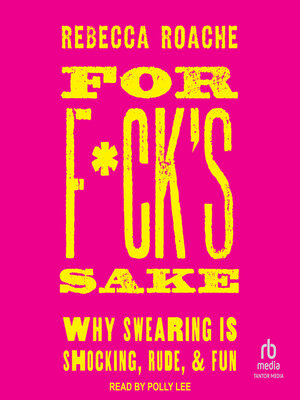
Sign up to save your library
With an OverDrive account, you can save your favorite libraries for at-a-glance information about availability. Find out more about OverDrive accounts.
Find this title in Libby, the library reading app by OverDrive.



Search for a digital library with this title
Title found at these libraries:
| Library Name | Distance |
|---|---|
| Loading... |
Why do we love to swear so much? Why do we get so offended when others do it?
In this lively and amusing exploration of the various puzzles that surround swearing, philosopher Rebecca Roache argues that what makes swearing offensive is not really the words at all: the offensiveness lies in what we don't say. The unspoken—and usually unconscious—inferences that speakers and listeners make about each other are key to explaining swearwords' capacity to shock. Swearing is unique among etiquette breaches in that it is designed to convey disrespect—swearing packs more of a punch than failing to say "please."
Roache helps listeners understand how swearing works, celebrating its power as a communicative tool and source of humor while also taking a close and serious look at specific words—those directed at women and women's bodies, for example—that function in particular, complex ways. She also examines the often-hypocritical ways swearing can be punished or censored.
Finally, Roache helps listeners appreciate that swearing isn't always bad. When it's not used offensively, it can foster social intimacy, can help people withstand pain, and might even help us curb our violent impulses.
In this lively and amusing exploration of the various puzzles that surround swearing, philosopher Rebecca Roache argues that what makes swearing offensive is not really the words at all: the offensiveness lies in what we don't say. The unspoken—and usually unconscious—inferences that speakers and listeners make about each other are key to explaining swearwords' capacity to shock. Swearing is unique among etiquette breaches in that it is designed to convey disrespect—swearing packs more of a punch than failing to say "please."
Roache helps listeners understand how swearing works, celebrating its power as a communicative tool and source of humor while also taking a close and serious look at specific words—those directed at women and women's bodies, for example—that function in particular, complex ways. She also examines the often-hypocritical ways swearing can be punished or censored.
Finally, Roache helps listeners appreciate that swearing isn't always bad. When it's not used offensively, it can foster social intimacy, can help people withstand pain, and might even help us curb our violent impulses.







